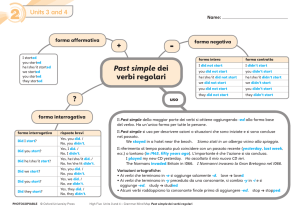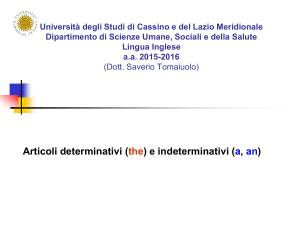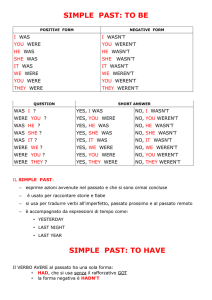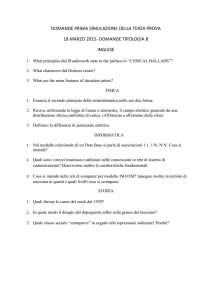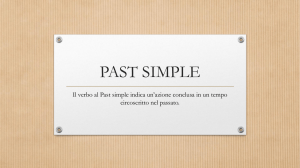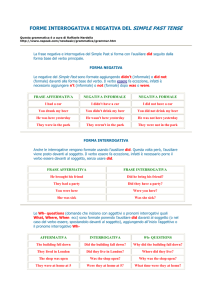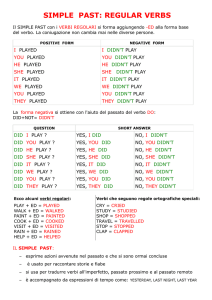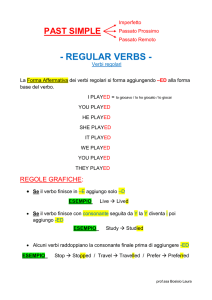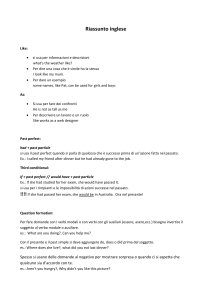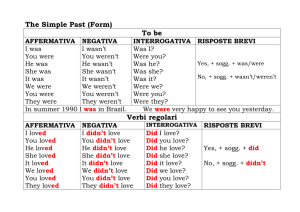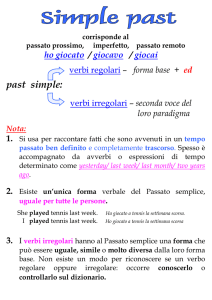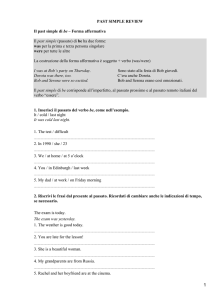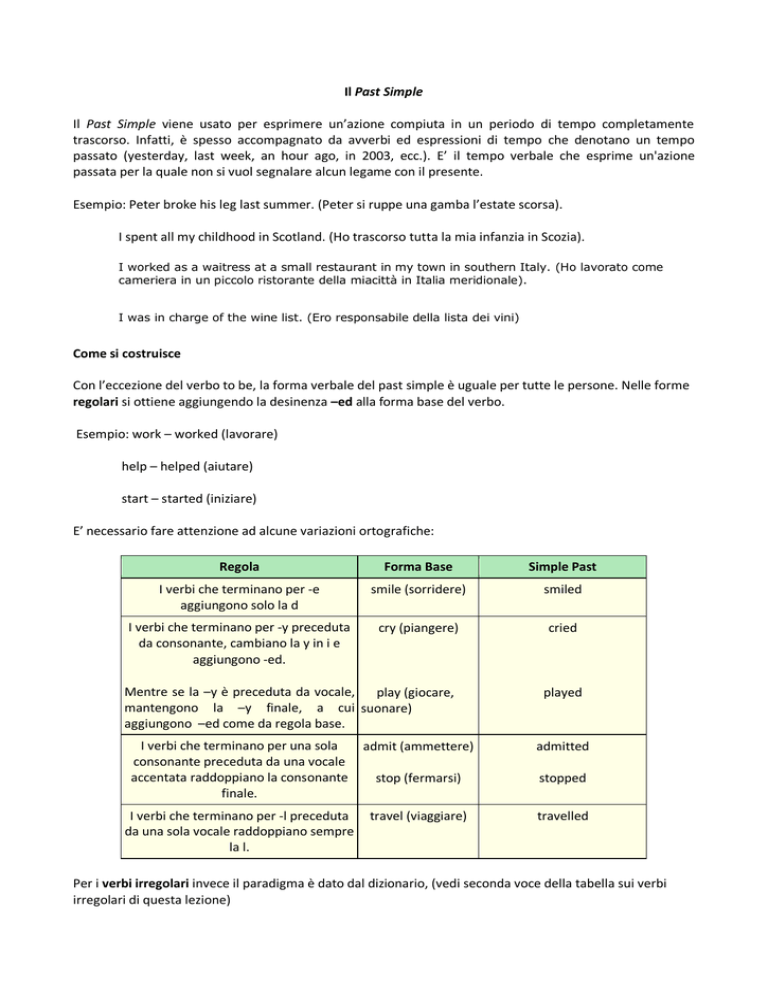
Il Past Simple
Il Past Simple viene usato per esprimere un’azione compiuta in un periodo di tempo completamente
trascorso. Infatti, è spesso accompagnato da avverbi ed espressioni di tempo che denotano un tempo
passato (yesterday, last week, an hour ago, in 2003, ecc.). E’ il tempo verbale che esprime un'azione
passata per la quale non si vuol segnalare alcun legame con il presente.
Esempio: Peter broke his leg last summer. (Peter si ruppe una gamba l’estate scorsa).
I spent all my childhood in Scotland. (Ho trascorso tutta la mia infanzia in Scozia).
I worked as a waitress at a small restaurant in my town in southern Italy. (Ho lavorato come
cameriera in un piccolo ristorante della miacittà in Italia meridionale).
I was in charge of the wine list. (Ero responsabile della lista dei vini)
Come si costruisce
Con l’eccezione del verbo to be, la forma verbale del past simple è uguale per tutte le persone. Nelle forme
regolari si ottiene aggiungendo la desinenza –ed alla forma base del verbo.
Esempio: work – worked (lavorare)
help – helped (aiutare)
start – started (iniziare)
E’ necessario fare attenzione ad alcune variazioni ortografiche:
Regola
Forma Base
Simple Past
I verbi che terminano per -e
aggiungono solo la d
smile (sorridere)
smiled
I verbi che terminano per -y preceduta
da consonante, cambiano la y in i e
aggiungono -ed.
cry (piangere)
cried
Mentre se la –y è preceduta da vocale,
play (giocare,
mantengono la –y finale, a cui suonare)
aggiungono –ed come da regola base.
played
I verbi che terminano per una sola
consonante preceduta da una vocale
accentata raddoppiano la consonante
finale.
admit (ammettere)
admitted
stop (fermarsi)
stopped
I verbi che terminano per -l preceduta
da una sola vocale raddoppiano sempre
la l.
travel (viaggiare)
travelled
Per i verbi irregolari invece il paradigma è dato dal dizionario, (vedi seconda voce della tabella sui verbi
irregolari di questa lezione)
Esempio: be – was/were (essere)
go – went (andare)
have – had (avere)
sleep – slept (dormire)
Essendo un tempo semplice, il Past Simple ha bisogno dell’aiuto di un ausiliare per fare le forme
interrogative e negative. Si usa l’ausiliare DID (che è la forma passata di to DO), in presenza del quale il
verbo dalla frase resta invariato nella sua forma base.
Forma
Costruzione
Esempio
Forma interrogativa
DID + SOGGETTO +
FORMA BASE
Did you work last night?
(Hai lavorato ieri sera?)
Forma negativa
SOGG. + DID + NOT +
FORMA BASE
I didn’t work last night
(Non ho lavorato ieri sera)
DID NOT>>>DIDN’T
Nelle risposte brevi, si usa: Yes + soggetto + ausiliare did; oppure: No + soggetto + ausiliare didn.’t
Esempio: Did you have a good time in the USA? Yes I did.
Did you go to Seattle? No, I didn’t.
Persona Forma affermativa Forma negativa Forma interrogativa Risposte brevi
I
asked
didn't ask
Did I ask?
Yes, I did - No, I didn't
You
asked
didn't ask
Did you ask?
Yes, you did - No, you didn't
He/She/It asked
didn't ask
Did he/she/itask? Yes, he/she/it did - No, he/she/it didn't
We
asked
didn't ask
Did we ask?
Yes, we did - No, we didn't
You
asked
didn't ask
Did you ask?
Yes, you did - No, you didn't
They
asked
didn't ask
Did they ask?
Yes, they did - No, they didn't
Coniugazione di to be
Persona
Forma
affermativa
Forma
negativa
Forma
interrogativa
Risposte brevi
I
You
was
were
wasn't
weren't
Was I?
Were you?
Yes, I was - No, I wasn't
Yes, you were - No, you weren't
He/She/It was
wasn't
Was he/she/it?
We
You
They
weren't
weren't
weren't
Were we?
Were you?
Were they?
were
were
were
Yes, he/she/it was - No, he/she/it
wasn't
Yes, we were - No, we weren't
Yes, you were - No, you weren't
Yes, they were - No, they weren't
Exercise 3:
Completa le seguenti frasi coniugando il verbo al past simple:
1. Last year I .....................(go) to England on holiday.
2. It ......................(be) fantastic.
3. I ........................(visit) lots of interesting places. I ......................(be) with two friends of mine .
4. In the mornings we .....................(walk) in the streets of London.
5. In the evenings we ........................(go) to pubs.
6. The weather .......................(be) strangely fine.
7. It ........................(not / rain) a lot.
8. But we ...........................(see) some beautiful rainbows.
9. Where ....................................(spend / you) your last holiday?
10. How long ..........................(stay/you) there?
Exercise 4:
Scegli il verbo appropriato per ognuna delle seguenti frasi e riscrivila coniugando il verbo al past simple:
1.The bus driver (come – stop – leave) at the traffic lights because the light was red.
2. Meg (see – write – spend) a lot of places during her holiday in Scotland.
3. Sue’s train (travel – go – arrive) in London at 10.48 AM.
4. Annie and Bill (listen to – read –speak) the radio in the afternoon.
5. Amelia (run – drop – get) some biscuits on the floor.
6. Melanie (decide – talk – come back) to Frankie about her exam.
7. The student (do – worry – prefer) his homework after dinner.
8. We (play – fill in – know) the form for the interview.
Exercise 5:
Riscrivi le seguenti frasi al negativo:
1. They collected postcards.
2. You jumped high.
3. Albert played squash.
4. The teacher tested our English.
5. Fiona visited her grandma.
6. He washed the car.
7. You were thirsty.
8. He had a computer.
9. I bought a new TV set.
10. You saw their house.
Exercise 6:
Scrivi delle domande al past simple utilizzando gli elementi dati. Per il corretto ordine degli elementi
all’interno della domanda tieni a mente quanto è stato detto nella lezione 1:
1. Anna / the window / open
2. she / home / walk / what time
3. you / in the garden / water the roses /yesterday
4. you / a song / sing /why
5. she / on that chair / how long / sit
6. they / the castle / visit
7. Jenny / why / the door / lock
8. she / happy / be /at that time
9. Greg / the ball / kick
10. the car / at the corner / stop
Exercise 7:
Alcune delle seguenti frasi contengono un errore, mentre altre no. Individua le frasi sbagliate e correggile.
1.- She didn’t bought the bread yesterday.
2.- I didn’t have enough money to pay the concert tickets.
3.- Did you know that Sally was my sister?
4.- We heard a noise in the middle of the night.
5.- My parents wasn’t very happy with my exam results.
6.- The teacher told the students to sit down.
7.- They never didn’t receive the money that they needed.
8.- She didn’t ate her breakfast this morning.
9.- Where did you buy these jeans?
10.- Was Paul in the library when you went there?

